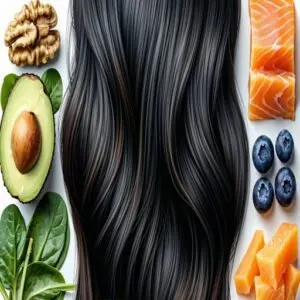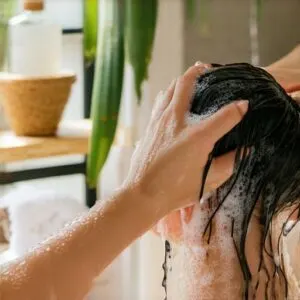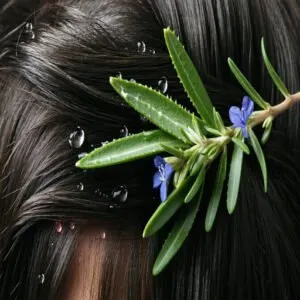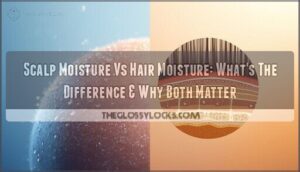This site is supported by our readers. We may earn a commission, at no cost to you, if you purchase through links.
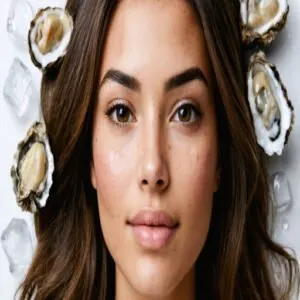
Start by feeding your scalp with zinc-rich foods like oysters and nuts, while omega-3 powerhouses like salmon and walnuts fight inflammation.
Just like a garden needs water to thrive, your scalp craves hydration – aim to drink half your body weight in ounces daily.
Give your scalp some TLC with gentle massage techniques to boost circulation, and skip the daily washing routine to maintain your natural oil balance.
There’s a whole world of natural oils and healing techniques waiting to transform your scalp care routine.
Table Of Contents
- Key Takeaways
- Nutrition for Scalp Health
- Improve Scalp Health Naturally
- Scalp Care Techniques
- Natural Remedies for Scalp
- Managing Stress for Scalp Health
- Frequently Asked Questions (FAQs)
- How can I improve my scalp health?
- Why is a healthy scalp important?
- How to maintain a healthy hair & scalp?
- What are the signs of a healthy scalp?
- Does a healthy scalp affect hair quality?
- What do you need to know about caring for your scalp?
- How can I strengthen my scalp naturally?
- How do you fix an unhealthy scalp?
- How to improve scalp hygiene?
- What causes poor scalp health?
- Conclusion
Key Takeaways
- You’ll boost your scalp health through nutrition by eating zinc-rich foods like oysters and nuts, omega-3 sources like salmon, and getting vitamins A and C from fruits and vegetables
- You can improve blood circulation by drinking half your body weight in ounces of water daily and giving yourself regular scalp massages with gentle techniques
- You’ll maintain healthier oil balance by avoiding daily washing, using sulfate-free shampoos, and protecting your scalp from sun damage with hats or specialized sunscreen
- You’re able to treat scalp issues naturally using remedies like aloe vera gel for soothing irritation, onion juice for hair growth stimulation, rosemary oil for preventing hair loss, and apple cider vinegar rinses for pH balance
Nutrition for Scalp Health
What you eat plays a big role in keeping your scalp healthy and your hair strong.
Nutrients like zinc, iron, vitamins A and C, and omega-3 fatty acids work together to boost circulation, hydrate your scalp, and support overall hair growth.
Foods Rich in Zinc and Iron
Zinc and iron are scalp health superheroes.
For zinc-rich foods, think oysters, red meat, and nuts.
Dietary iron sources like shellfish, poultry, and legumes boost oxygen to hair follicles, strengthening roots.
To learn more about zinc rich foods, explore various sources to maintain a balanced diet.
Nutrient-dense meals keep your mineral balance in check, so your scalp thrives.
Skip the fad diets—focus on foods for scalp health to nourish from within!
Importance of Vitamin a and C
Want a healthy scalp? Vitamins A and C are your MVPs. They’re antioxidants that protect your scalp from damage, boost collagen production, and improve circulation for hair growth.
For further information, check out these healthy scalp tips.
Add these to your plate:
- Carrots and sweet potatoes (vitamin A)
- Citrus fruits and strawberries (vitamin C)
- Bell peppers for a crispy punch
- Spinach, because greens never fail
- Fortified foods for extra support to enhance your overall scalp health.
Benefits of Omega-3 Fatty Acids
Omega-3 fatty acids are your scalp’s best-kept secret for reducing inflammation and supporting natural hair care.
These fatty acids boost blood flow to hair follicles, encouraging healthy hair growth.
Snack on walnuts or chia seeds, or try fish oil supplements for a boost.
| Omega Rich Foods | Scalp Health Benefits |
|---|---|
| Salmon | Reduces dryness |
| Flaxseeds | Fights inflammation |
| Sardines | Promotes hair growth |
| Walnuts | Improves hydration |
Hydration for Blood Circulation
Staying hydrated is like giving your scalp a fresh start every day.
Your water intake fuels blood flow and maintains fluid balance, ensuring healthy circulation for scalp hydration and scalp health.
Proper scalp circulation techniques can also enhance overall scalp health.
Aim to drink half your weight in ounces of water daily.
Try adding lemon or berries for taste—a happy, healthy scalp starts with proper hydration!
Improve Scalp Health Naturally
Want your scalp to feel like a healthy garden, full of thriving hair follicles? Start with a scalp detox—it’s like hitting reset for your scalp.
Natural oils are your scalp’s best friend, so let them do their job. For specific scalp issues, explore these natural remedies for dry scalp. Avoid overwashing your hair, which can strip away those oils, throwing off your scalp balance.
Try using a natural shampoo packed with nourishing ingredients to keep things healthy. And who doesn’t love a good scalp massage? The benefits include increased blood flow and happier, more resilient roots.
- Treat yourself to a DIY scalp mask with aloe vera or honey.
- Switch to sulfate-free, natural shampoos for healthier care.
- Gently brush daily to distribute oils evenly.
- Stick with lukewarm showers to prevent drying out.
- Drink water often—hydration supports scalp health!
Scalp Care Techniques
Taking proper care of your scalp guarantees a strong foundation for healthy, vibrant hair. From gentle washing to regular exfoliation, small adjustments in your routine can make a big difference.
Gentle Hair Washing Methods
When washing your hair, treat your scalp like fine silk—easy does it.
Use gentle hair washing methods with sulfate-free shampoos for scalp soothing and improved scalp health.
Applying a sulfate free shampoo can be particularly beneficial for sensitive scalps.
Apply a quarter-sized amount of natural shampoo, focusing on the roots.
Avoid scalding water; lukewarm is your friend.
Finish with a cool rinse to lock in moisture and give your scalp some love.
Benefits of Scalp Massage
A scalp massage isn’t just relaxing—it boosts blood circulation, helping hair follicles thrive.
For further information, explore these scalp massage benefits.
Scalp stimulation may encourage hair growth over time, and regular massage techniques can ease tension while improving scalp health.
Whether you’re battling scalp irritation or seeking relaxation therapy, a quick daily massage is like a mini spa treatment for your head, delivering noticeable scalp massage benefits.
Exfoliating for Dead Skin Removal
A flaky scalp needs exfoliation to remove dead skin and boost scalp health. Try these steps:
- Use natural scrubs like brown sugar or oatmeal for gentle removal.
- Massage with an exfoliating shampoo to cleanse deeply.
- Apply apple cider vinegar for natural skin renewal.
- Explore DIY remedies like aloe vera mixes.
- Exfoliate weekly for healthier, fresher roots!
For a deeper cleanse, consider a scalp detox treatment.
- Use natural scrubs like brown sugar or oatmeal for gentle removal.
- Massage with an exfoliating shampoo to cleanse deeply.
- Apply apple cider vinegar for natural skin renewal.
- Explore DIY remedies like aloe vera mixes.
- Exfoliate weekly for healthier, fresher roots!
Protecting Scalp From Sun Damage
Your scalp isn’t immune to sunburn; UV damage can wreak havoc on scalp health.
For effective scalp protection, wear a wide-brimmed hat and apply sunscreen designed for your hairline or scalp.
Scalp shielding is essential for summer care, so don’t skimp on prevention.
Natural remedies for hair like aloe vera soothe burns, but prevention beats the cure every time!
Natural Remedies for Scalp
You can boost your scalp health with natural remedies that are both effective and simple to use.
From aloe vera‘s soothing properties to rosemary oil‘s growth-stimulating benefits, these treatments offer a gentle way to care for your scalp.
Aloe Vera Gel Benefits
For natural healing and hair nourishment, aloe vera gel is a game-changer.
Slathering on this soothing scalp treatment can calm irritation, reduce dandruff, and improve scalp health by deeply hydrating your skin.
You can find a variety of aloe vera scalp treatment products online.
It’s a simple natural hair remedy to try, and using aloe vera can be very beneficial, making it a great natural hair remedy to toss commercial scalp care products aside—your fridge probably has better gel applications than those overpriced bottles anyway!
Onion Juice for Hair Growth
Aloe vera’s soothing properties are fantastic, but if you’re tackling hair loss, onion juice benefits might surprise you.
Packed with sulfur, it supports strong hair by boosting protein production. Plus, it gets blood flowing to follicles, kickstarting growth.
- Sulfur content strengthens roots.
- Supports natural scalp stimulation.
- Promotes hair growth stimulation.
- A go-to for effective natural hair remedies!
Rosemary Oil for Hair Loss
Rosemary oil isn’t just a kitchen star—it’s a scalp savior.
Known for promoting hair regrowth, its natural oil therapy stimulates scalp health by improving circulation to hair follicles.
Regular use combats hair loss and supports thicker, stronger tresses.
Massage it in for scalp stimulation, and you’ve got one of the easiest natural hair remedies to boost growth and confidence.
Apple Cider Vinegar Rinse
If Rosemary oil works wonders, wait till you try an apple cider vinegar rinse.
It restores your scalp’s pH and acts as a natural exfoliant, removing buildup from your hair care routine.
To clarify hair and balance acid levels, mix two tablespoons of vinegar with water, use it weekly for shiny hair and a happier scalp, achieving shiny hair.
Managing Stress for Scalp Health
Stress doesn’t just mess with your mood—it can actually impact your scalp health and cause hair issues like dryness or shedding.
By managing stress through simple techniques like deep breathing or regular exercise, you’ll support a healthier scalp and stronger hair.
Relaxation Techniques for Hair Loss
Stress takes a toll on your scalp health, making hair loss a common concern.
Combat this through deep breathing exercises that reduce cortisol levels and boost circulation.
Try mindful meditation to stay present and calm, or practice yoga exercises that blend physical movement with stress reduction.
Progressive muscle relaxation helps release tension, while regular scalp massages improve blood flow for maximum hair growth.
Dandruff Control and Treatment
While relaxation can help your overall scalp health, dandruff needs a targeted approach.
You might notice flaky scalp and itching when fungal infections or scalp inflammation strike. For a deeper cleanse, consider a scalp detox treatment.
Here’s what works:
- Wash with zinc pyrithione shampoo twice weekly
- Apply diluted tea tree oil for natural itchy scalp relief
- Try scalp exfoliation with a soft brush
- Use apple cider vinegar rinse weekly
- Keep a food diary to track flare-ups
These steps reduce dandruff without harsh chemicals.
Limiting Heated Styling Tools
Heat styling tools can be silent saboteurs of your scalp’s well-being.
To prevent hair damage and breakage, apply heat protection products before styling and keep your tools moving constantly to avoid concentrated heat spots.
Limit heat styling to 2-3 sessions weekly for ideal Hair Damage Prevention.
| Styling Method | Heat Protection | Recommended Frequency |
|---|---|---|
| Air Drying | None needed | Daily safe use |
| Cool Setting | Light protectant | 4-5 times weekly |
| Heat Styling | Heavy protectant | 2-3 times weekly |
| High Heat Tools | Maximum protection | Once weekly max |
Maintaining a Healthy Diet for Scalp Health
Your scalp’s health starts from the inside out.
Just like your hair needs protection from heat, your follicles need nourishment from a balanced diet.
A nutrient-rich diet for healthy hair can transform your scalp health naturally.
Focus on these power-packed foods:
- Probiotic-rich yogurt and kimchi for a balanced scalp microbiome
- Omega-3 rich foods for healthy fats and scalp balance
- Fresh produce packed with antioxidants and vitamins
- Fiber-rich legumes and whole grains
- Nuts and seeds for protein and essential nutrients
Frequently Asked Questions (FAQs)
How can I improve my scalp health?
Maintain balanced nutrition with protein-rich foods, massage your scalp daily for circulation, use gentle sulfate-free shampoo.
Incorporate natural oils like aloe vera, don’t overwash, and protect from sun damage with hats.
Why is a healthy scalp important?
Think of your scalp as your hair’s VIP lounge – it’s where the magic happens.
A healthy scalp means better blood flow, stronger hair roots, and reduced risk of issues like dandruff or hair loss.
How to maintain a healthy hair & scalp?
You’ll want to massage your scalp daily, use sulfate-free shampoos, and eat protein-rich foods. Don’t overwash your hair, protect it from harsh sun, and stay hydrated for ideal scalp health.
What are the signs of a healthy scalp?
A crown-worthy scalp shows no redness, flakes, or itching.
You’re rocking a healthy head when your hair’s got bounce, there’s no excessive oiliness, and the skin beneath feels comfortable, not tender.
Does a healthy scalp affect hair quality?
A healthy scalp directly impacts your hair’s appearance and strength.
When your scalp’s in good shape, it provides essential nutrients and oils, leading to shinier, stronger strands that grow more effectively and resist damage.
Your scalp being in good shape is crucial for healthier hair growth.
What do you need to know about caring for your scalp?
Regular scalp care needs gentle washing, proper nutrition, and stress management.
Focus on using sulfate-free products, maintaining hydration, and incorporating scalp massages.
Don’t forget protective measures against UV rays and harsh chemicals.
How can I strengthen my scalp naturally?
Like a garden needing nutrients, your scalp thrives with daily scalp massage, omega-rich foods, and natural oils.
Boost circulation by massaging with coconut oil, and don’t forget to protect it from harsh UV rays.
How do you fix an unhealthy scalp?
Try microneedle treatment with immune-regulating compounds, use gentle sulfate-free shampoo, and apply targeted scalp medications. You’ll benefit from specialized vitamin-rich treatments and protection from environmental damage while maintaining proper hydration.
How to improve scalp hygiene?
Cleanliness is next to godliness in scalp care.
Wash your hair 2-3 times weekly with sulfate-free shampoo, massage gently while washing, and use cool water to seal cuticles.
Do not forget to exfoliate weekly.
What causes poor scalp health?
Your scalp’s health can suffer from overwashing, harsh products, poor nutrition, stress, and environmental factors. Lack of vitamins, dehydration, and scalp-unfriendly styling tools also contribute to common scalp issues.
Conclusion
There’s no need to scratch your head wondering how to improve scalp health naturally – you’ve got all the tools right at your fingertips.
By combining proper nutrition, gentle care techniques, and stress management, you’re well on your way to a healthier scalp.
Remember that consistency is key, and small changes in your daily routine can lead to significant improvements.
Your journey to better scalp health starts with these simple, natural approaches that nurture both your hair and overall well-being.
- https://ogariolondon.com/improve-scalp-health-naturally/
- https://www.healthline.com/health/beauty-skin-care/healthy-scalp
- https://www.wikihow.com/Get-a-Healthy-Scalp
- https://www.umbertogiannini.com/blogs/hair-stories/8-top-tips-for-a-healthy-scalp-and-longer-healthier-hair
- https://naturallclub.com/blogs/the-naturall-club-blog/how-to-maintain-a-healthy-scalp

